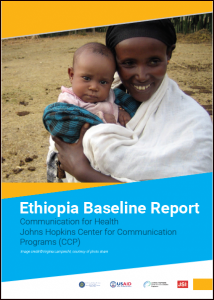Communication for Health Project Baseline Report
This report contains findings from a cross sectional survey covering six health areas that identified key behavioral determinants including three gateway behaviors (Early ANC, Family Health Guide & Hand washing Station), and Gender. The report provides estimates of health services uptake and health behaviors by rural women in Ethiopia.
The objectives of the baseline study are the following:
- Objective 1: To provide baseline estimates for target population-level health indicators related to utilization, care seeking, knowledge, attitudes, gender norms, and practice.
- Objective 2: To identify key behavioral determinants for health services use and health practice in project target regions.
- Objective 3: To identify appropriate communication channels for targeted populations in the intervention regions.
Data were collected from August to September 2016 in four regions of Ethiopia, Amhara, Oromia, Tigray, and SNNP. A total of 2,770 women of reproductive age (15–49 years) were interviewed, using a structured survey covering six health areas. The 38 baseline key indicators were explored, and a behavioral analysis was conducted with 16 major behavioral outcome variables, using logistic regression analysis.
Gender was found to be a cross-cutting issue across all six health areas of focus, with the norms related to gender inequality adversely impacting several health behaviors. The report also describes media availability and utilization trends in four regions of Ethiopia. The different sources of health information depict a scenario that identify the most commonly used media sources and health topics in four regions of Ethiopia. The study also found regional variation across multiple health behaviors. High vulnerability or low standard of living in women leads to low levels of adoption for several health behaviors. Knowledge was related to 10 out of 16 behaviors, and selfefficacy was also related to six out of 16 health behaviors.
Source: Communication for Health Ethiopia
Date of Publication: February 6, 2020
SIMILIAR RESOURCES
Tools
Examples
- The Behavior Change Framework
- Advocating for Social Marketing Programs to Local Stakeholders
- Using Data to Design an Evidence-based Social and Behavior Change Program in Rural Nepal
- Moving the Needle on Health Behaviors
- MULTI-SBC: The Programmatic Aid for Multi-Sectoral Integration of SBC for FP Practitioners
- La Planification Familiale dans les Situations d'Urgence: Essentielle,, Voulue, Necessaire et Realisable
- Barrier Analysis Questionnaires
- GESI Toolkit
- COVID-19 Hygiene Hub
- Water, Sanitation and Hygiene: 10 Reasons WASH is a Pathway to Gender Equality and the Empowerment of Women and Girls
- Baseline Study Findings: A Brief Overview
- Mid-Term Evaluation of The Communication for Health Project in Ethiopia
- End of Project Report: The Communication for Health Project in Ethiopia
- Review of Literature across Six Health Areas in Ethiopia
- Exploring Sociocultural Determinants of Health Service Use and Health Behavior in Ethiopia

